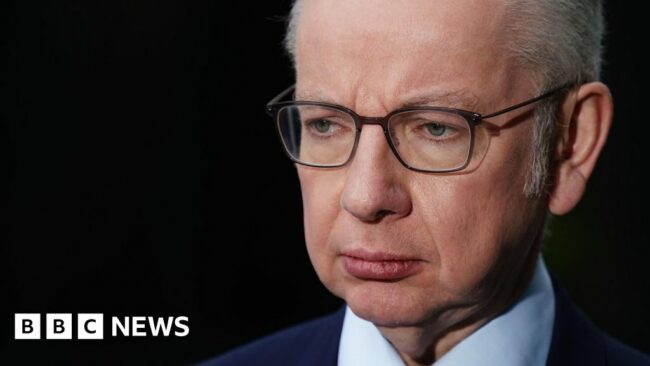Scotland Correspondent
There could be a second Scottish independence referendum if the public show “overwhelming support” for one, according to Michael Gove.
The former Conservative minister, who sat in the cabinet for most of the period between 2010 and 2024, told BBC Scotland’s The Sunday Show that he didn’t think another referendum was necessary.
But he conceded that the UK government may have to change approach if SNP popularity and support for another vote grows.
Last week, First Minister John Swinney said that he wanted to achieve “demonstrable support” for independence.
UK is a ‘living thing’
Gove, who held various cabinet positions under three Conservative prime ministers, was often tasked with overseeing relations between the UK and Scottish government.
While he doesn’t think Scottish independence is currently on the agenda, he is warning supporters of the union not to “assume any degree of complacency.”
Gove described the UK as a “living thing” and added that politicians had to continually demonstrate that the union was working.
The former minister said that he didn’t think a second referendum was “necessary at the moment”, but added that if there was “an overwhelming desire on the part of the Scottish people for one then we’d have to review the decision.”
When pressed on what would trigger such a change in policy, Gove said that was for the Westminster government to decide.
He added that he believed too much focus on the constitution was bad for all political parties and that governments should “retain confidence” by concentrating on the economy, health and transport.
Gove was part of a government that rejected requests from the Scottish government for a second referendum.
He denied that this was anti-democratic and insisted that Scotland had “more important” issues to deal with.
Gove now suggests that the likelihood of a second independence vote was linked to the SNP’s ability to improve public services.
“If, for the sake of argument, the SNP make all of those decisions in government in a way that gives people confidence in them then we might be in a different position [on a second referendum]”, he said.
Michael Gove and SNP leader John Swinney do not have much in common politically, but they seem to be delivering a relatively similar message on this topic.
Last week, the first minister talked about securing “demonstrable support” for independence.
Swinney compared this to the 1997 referendum for a Scottish parliament, which was backed by around 74% of Scots.
The message seemed to be that independence will move forward when public support demands it in greater numbers.
But the first minister also told BBC Scotland News that it was “completely unacceptable” for the independence movement “to be thwarted by a Westminster government that just folds it’s arms and says ‘no’.”
Gove is no stranger to disagreements with Scottish government ministers.
He insists that relations were broadly cordial and productive when he was in government. But it’s fair to say there were times when relationships soured.
Back in 2023, the UK government made the unprecedented decision to veto Holyrood’s Gender Recognition Reform bill.
This legislation would have made it easier for trans people to ‘self-identify’ and change their legally recognised sex, without a diagnosis of gender dysphoria.
Gove chaired a committee of ministers who agreed to enact Section 35 of the Scotland Act.
This allows a UK minister to veto a Holyrood bill if they think it would modify laws reserved to Westminster and have an “adverse effect” on how those laws apply.
This power had never been used before and it has not been used since.
Last month, the Supreme Court ruled that the term ‘woman’ related to biological sex under the Equality Act.
And Gove believes this proved that deploying the section 35 order was the correct call.
“I think it was absolutely the right decision, and I think it’s been vindicated by subsequent events”, he added.
Though Mr Gove stressed that the Section 35 provision must remain a “fail safe power” that is “used sparingly”.
At the time the Scottish government characterised the veto as a “direct attack” on the Scottish Parliament.
Gove stood down as an MP last year and is now editor of the Spectator magazine. He is due to enter the House of Lords this week as Lord Gove of Torry.
His chosen title is a tribute to the Aberdeen suburb where his family’s fish processing business was based.
So how concerned is the native Aberdonian about the state of the Scottish Conservatives?
Some polls have suggested that the emergence of the Reform Party could see them drop from second to fourth place in next year’s Holyrood election.
Speaking from the leather couches of his editor’s office at the Spectator’s London HQ, he tells the Scottish wing of his party “don’t panic”.
The former cabinet minister deploys an Aberdeen Football Club analogy to assess the situation.
For those not following the twist and turns of Scottish football, the Dons have had an up and down season.
But they still find themselves with a shot at silverware in the Scottish cup final next weekend.
He says the important lesson is “not to change the manager” but to “stick together as a team”.
That reassurance may go down well with both UK party leader Kemi Badenoch and Scottish Tory leader Russell Findlay, who must scale political mountains if they are to deliver success.
But there may yet be a warning contained within Mr Gove’s Aberdeen FC comparison.
They have finished the season in fifth place.
That’s the sort of fate the Scottish Conservatives are desperate to avoid.
www.bbc.com
